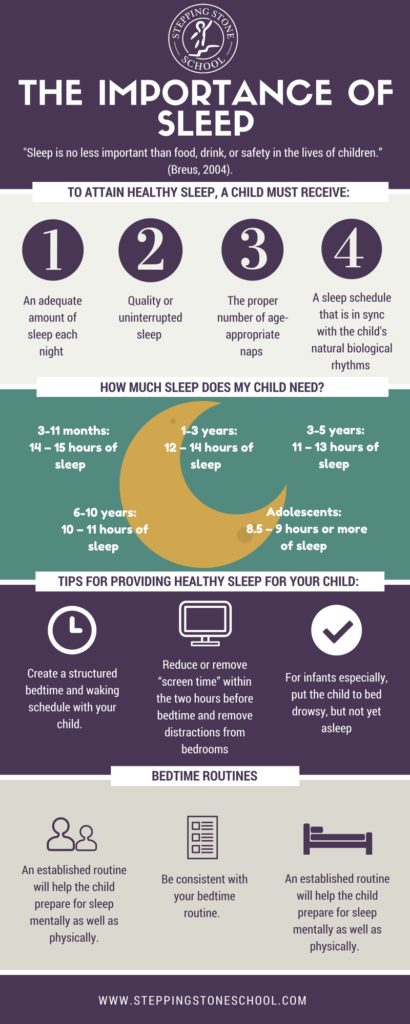Importance of Sleep
I pulled up to my daughter’s elementary school at the end of her first day of Kindergarten. I saw her waiting in the car rider lane with half of her hair pulled out of her pony tail and her thumb in her mouth – the tell-tale signs that my five-year-old was exhausted.
Not all children are as obvious in displaying their exhaustion. Dr. Michael Breus, clinical psychologist and a leading specialist on sleep disorders, connects a slew of behaviors with the amount of sleep a child gets each night. Children who get enough healthy sleep are “optimally alert” which means they demonstrate the greatest attention span and can learn the most about their environment and about others. On the other hand, children who get too little sleep become inattentive, easily distracted, impulsive, hyperactive, or sluggish (Breus, 2004).
What is Healthy Sleep?
Dr. Breus states “sleep is no less important than food, drink, or safety in the lives of children.” (Breus, 2004).
Though we often associate sleep with our bodies being still and at rest, our brain is always active. Within sleep, there are two stages, the Rapid Eye Movement (REM) phase and the Non-Rapid Eye Movement (non-REM) phase. In REM sleep, children and adults experience dreams. Without adequate REM sleep, people demonstrate a lack of memory formation (Sonic Learning).
Medical doctor, Marc Weissbluth, provides astute comments on how sleep affects a person:
“Sleep is the power source that keeps your mind alert and calm. Every night and at every nap, sleep recharges the brain’s battery. Sleeping well increases brainpower just as weight lifting builds stronger muscles, because sleeping well increases your attention span and allows you to be physically relaxed and mentally alert at the same time. Then you are at your personal best.” (Breus, 2004)
To attain healthy sleep, a child must receive:
- An adequate amount of sleep each night
- Quality or uninterrupted sleep
- The proper number of age-appropriate naps
- A sleep schedule that is in sync with the child’s natural biological rhythms (Breus, 2004)
The Benefits of Healthy Sleep
Studies relating to the importance of sleep suggest a “critical period of brain development that is sensitive to sleep.” As researchers continue to explore all the connections between cognitive development and sleep, there are implications that healthy sleep is required for neural development. (Dahl, 2007).
When a child has received adequate daily sleep, he or she is “happier, more self-assured, less demanding, and a more sociable child.” (Breus, 2004)
How much sleep does my child need?
Each child is different, but most experts recommend the following amounts per age for each 24-hour period:
- 3-11 months: 14 – 15 hours of sleep
- 1-3 years: 12 – 14 hours of sleep
- 3-5 years: 11 – 13 hours of sleep
- 6-10 years: 10 – 11 hours of sleep
- Adolescents: 8.5 – 9 hours or more of sleep
(Sonic Learning)
Tips for Providing Healthy Sleep for your Child:
- If you are not doing so already, begin to create a structured bedtime and waking schedule with your child.
- Reduce or remove “screen time” within the two hours before bedtime and remove distractions from bedrooms.
- Create a relaxing bedtime routine which may include a warm bath, dimming the lights, lowering the temperature of the room, and reading a book together.
- For infants especially, put the child to bed drowsy, but not yet asleep
- Be consistent with your bedtime routine. An established routine will help the child prepare for sleep mentally as well as physically.

As we head into the winter months, now is the perfect time to introduce earlier bedtime routines with the natural occurrence of shorter days and longer nights. Use this opportunity to adjust your family’s schedules to prioritize a healthy sleep practices.
Resources:
Breus, M. (2004, Oct. 21). Good, Sound Sleep for Your Child. Retrieved from https://www.webmd.com/children/features/good-sound-sleep-for-children#1
Dahl, R. (2007 Sep 1). Sleep and the Developing Brain. Retrieved from https://www.ncbi.nlm.nih.gov/pmc/articles/PMC1978403/